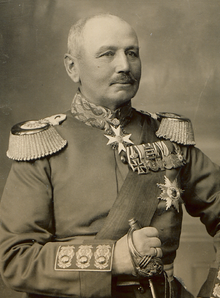Alexander von Kluck
| Alexander von Kluck | |
|---|---|

General von Kluck
|
|
| Born |
20 May 1846 Münster, Westphalia |
| Died | 19 October 1934 (aged 88) Berlin, Germany |
| Allegiance |
|
| Service/branch | Prussian Army |
| Years of service | 1866-1916 |
| Rank | Generaloberst |
| Commands held | 1st Army |
| Battles/wars |
Austro-Prussian War Franco-Prussian War World War I |
| Other work | Author |
Alexander Heinrich Rudolph von Kluck (20 May 1846 – 19 October 1934) was a German general during World War I.
Kluck was born in Münster, Westphalia on 20 May 1846. He was the son of architect Karl Kluck and his wife Elisabeth, née Tiedemann. He visited school Paulinum in his hometown Münster.
In 1874 he married Fanny von Donop (1850–1938); they had three sons and one daughter.
He enlisted in the Prussian army in time to serve in the seven-week Austro-Prussian War of 1866 and the Franco-Prussian War, where he was wounded twice in the Battle of Colombey-Neuilly, and awarded the Iron Cross (second class) for bravery. He was made a general of infantry in 1906, and in 1913 was appointed Inspector General of the Seventh Army District.
With the outbreak of World War I, Kluck was placed in command of the German First Army. According to the Moltke revisions of the Schlieffen Plan, the First Army was part of the strong right wing and positioned on the outer western edge of the German advance through Belgium and France. This western flank was to advance alongside Karl von Bülow's Second Army to Paris. Upon reaching Paris in concert, the First and Second armies were to threaten Paris from both the west and east.
After fighting the British at Mons and Le Cateau, the First Army pursued Lanrezac's French Fifth Army during the great retreat. However, thirty miles from Paris and anticipating an encounter with the French Fifth Army (commanded by Lanrezac), the cautious Bulow halted his Second Army's advance and ordered Kluck's direct support. Kluck had recently been placed under Bulow's command when the latter was appointed to command the German right wing. Kluck protested this order to Bulow and Moltke, as he preferred to move past Lanrezac's left flank, but was overruled and ordered to support Bulow's attack on Lanrezac. By this time, the aggressive Kluck had advanced his First Army well south of von Bulow's position to 13 miles north of Paris. On August 30, Kluck decided to wheel his columns to the east of Paris, discarding entirely the Schlieffen Plan. Although frustrated by Bülow's caution, on 31 August Kluck turned his army southeast to support the Second Army. In so doing, Kluck created a 30-mile gap in the German line extending toward Bülow's stalled Second Army. Critically, the move exposed Kluck's right flank in the direction of Paris where (unknown to Kluck) General Michel-Joseph Maunoury's new Sixth Army was deployed. The French learned of Kluck's change in course on September 3 thanks to reports from Allied aircraft, and this was independently confirmed by radio intercepts. The following events were critical to the future course of the war.
...
Wikipedia
